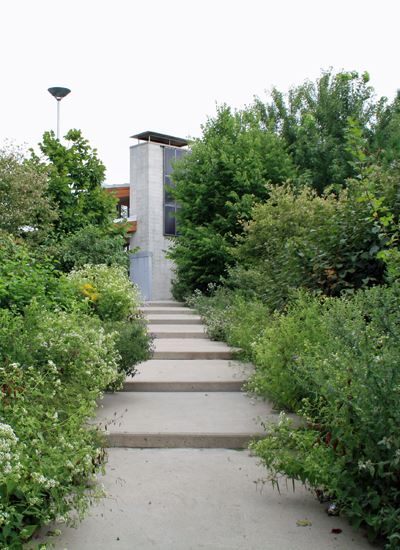1. How did you become interested in landscape design/horticulture/gardening?
I’ve been a plant lover my whole life and when I started putting plants together in the landscape, I found a new way to express myself that was deeply satisfying because I was just a wand in nature’s hand. I cultivated listening and observing the natural world even more obsessively. My way of caring for others also came through a love of cooking. “Where did my food come”, I wondered at an early age? With uncertain economic times and a fragile political world environment in the 1980’s, a practical choice for my higher education led me to food and nutrition….”no matter how uncertain the times, I could be always useful feeding people”, was how I thought….and I still do. So, edible plants are an important feature of my plant palette. Beautiful gardens and landscapes have a mix of plants that thrive in community, and that’s how I try to approach every landscape.
2. What are some of the challenges and limitations you’ve encountered practising environmentally-friendly gardening and landscaping?
At first, it was that I saw what a garden and landscape could be and that this was not supported by the norm of the day. It’s true, I have a naturalistic style. But then I found Gaia College and a community of like-minded people working in horticulture and garden design. This changed everything for me – I wasn’t alone and I discovered a practice guideline and philosophy through joining SOUL that helped me fine tune my knowledge and skills. Today, however, one of the biggest limitations is sourcing materials, whether it’s plants or soil amendments. But that is dramatically changing in the last year as more and more people realize how urgent our earth care has become. Another obstacle is that there is a lot of ‘green washing’ in the public and commercial arena. Many ‘practices’ are held up as being GREEN or environmentally friendly, when in fact, these are not. For example, dethatching lawns as a regular practice to maintain lawn health ‘naturally’ is just false, and very harmful to the grass plants. The predominant mode of problem solving is a symptoms-based approach which does not address the underlying cause(s) of the problem. One has to cultivate a holistic way of seeing things to really work WITH nature, not against Her.
People who are tuned into the nature of Nature but also realize how much we have still to learn are seeking others who can lead them and share how to design, build and care for healthier landscapes and gardens. I don’t get much interest in trying to convince people that there are other ways of doing things. But those who already know we have to change what we’ve been doing, but don’t know how to, are listening, and seeking out those who are working sustainably or I would rather say, regeneratively. (“Sustainable” implies a status quo whereas “Regenerative” means to improve systems to the point they can be better than before).
3. In the past few years, have you noticed a shift in the public's interest in incorporating land care practices that have a lower environmental impact than conventional practices? If so, what do you think is driving this interest?
YES! Climate change urgency has every discipline talking about its own impacts propelling this crisis. Attention on ‘grow more, mow less’, pollinator awareness, insect and bird population collapses, food sovereignty issues, seriously declining levels of fresh quality water, nature’s rights, all shine a light on how we impact the land with our current predominant agricultural practices, as well as urban land development and its care.
4. Can you describe one of the most interesting projects you've worked on related to regenerative land care?
It’s hard to pick just one so these 3 show the scope of how we can all work in this field:
a)New build for a home owner: Enhancing soil ecology through as little disturbance as possible. Where there is a need for bringing in soil or stockpiling, protecting it with cover crops and mulch. Enhancing the soil ecology through biodiverse plantings. Planting native plant communities together with edible plant diversity. No lawn!
b)Municipal park maintenance – consulting on several Toronto parks by focussing on enhancing soil microbiology diversity for plant health. The practices and types of plants all impact the health of the soil – which is the earth’s skin and is alarmingly being depleted all around the globe (plus it costs less in the long-run).
c)Rooftop urban farming consultant – again focussing on enhancing soil microbiology diversity for plant health and yielding excellent harvest!
.png) Photos: Corktown Common Park in Toronto where Astrid was a consultant on the park's organic land care practices. Photos: A. Muschalla |  |

.JPG)